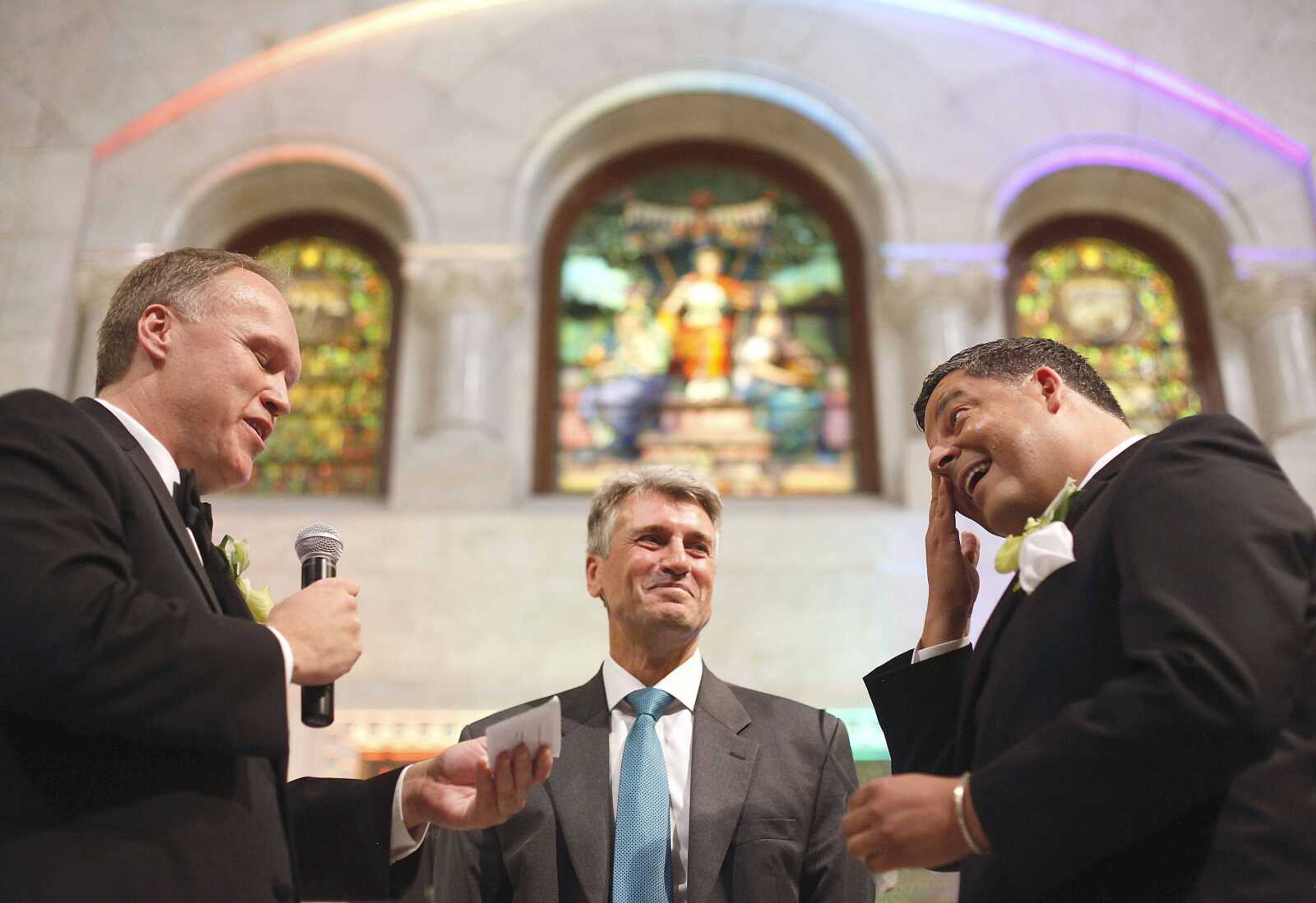Mayor invites Illinois same-sex couples to wed in Minnesota
CHICAGO -- With all of Illinois' financial woes, residents have grown accustomed to politicians from other states trying to raid its companies, jobs and best workers. Now one of them is making a similar pitch to the state's gay couples: Come north to get married, and spend lots of money...
CHICAGO -- With all of Illinois' financial woes, residents have grown accustomed to politicians from other states trying to raid its companies, jobs and best workers.
Now one of them is making a similar pitch to the state's gay couples: Come north to get married, and spend lots of money.
Minneapolis Mayor R.T. Rybak, who recently married 46 same-sex couples after his state's passage of a law legalizing gay weddings, will appear in a predominantly gay Chicago neighborhood today to launch a campaign called "Marry Me in Minneapolis." He plans to follow with campaigns in Colorado and Wisconsin, two other states that haven't approved same-sex marriage.
Rybak is trying to convince Chicagoans that rather than take a long -- and expensive -- plane trip to one of the coasts, just drive six hours to his city. Recently, many gay couples in the Midwest have said their vows in Iowa -- the only state directly bordering Illinois that allows same-sex weddings.
He's trying to capitalize on disappointment among Illinois gay couples that the state, dominated by Democrats, still hasn't approved a marriage law and likely won't anytime soon with lawmakers on recess.
"I love Chicago and love to come spend money there, but if people there don't get the rights they deserve, I am more than happy to have them come and spend their money in Minneapolis," he said in a telephone interview.
Rybak figures the campaign, if successful, could be extremely lucrative for Minneapolis, profiting on everything from hotel rooms to flowers to caterers.
"Even 20 weddings would be tens of thousands of dollars, maybe hundreds of thousands of dollars," Rybak said.
Some same-sex couples in Illinois say their first choice would be to get married locally. But they say Rybak's offer makes some sense, particularly if lawmakers in Illinois fail to come up with anything anytime soon.
Aana Vigen, a college professor in Chicago, said that although she and her partner haven't given a Minnesota wedding any thought, they would consider it if they thought it could benefit her family.
"I can tell you that [we] are very concerned about protecting our family ... and if we can reinforce for our son that we are a family and have something that recognizes that we are a family, we might take the mayor up on his offer," she said.
The thought of all those couples and their families hopping in the car and driving to spend their money elsewhere angers Mayor Rahm Emanuel, who has spent two-plus years in office trying to generate revenue for the city.
"Failing to extend marriage to gay and lesbian couples is bad for Chicago, bad for Illinois, and bad for our local economy and the jobs it creates," he said in a statement. "Our robust tourism and hospitality industries will thrive most fully when our state hangs out the 'welcome' sign for everybody."
Rybak's planned visit also caught the attention of Gov. Pat Quinn, who's overseeing a state that is grappling with a $100 billion public pension shortfall and billions of dollars in unpaid bills to state service providers. In a statement, he said failure to pass a same-sex marriage law not only "costs people their rights, but also has an economic cost."
If Minneapolis' offer attracts even a fraction of the state's gay couples it could mean millions of tourism dollars. One study by the Williams Institute, a national think tank at UCLA's law school, concluded that if Illinois does extend marriage to same-sex couples, half of the state's approximate 23,000 same sex couples will get married within three years. And that, the study found, would pump more than $100 million into the state and local economy.
The Williams Institute also found that 60 percent of same sex couples are traveling out of their home states to get married, at least in the three states that track those statistics.
In some instances, the percentages are even higher. Doug Johnstone, the town clerk of Provincetown, Ma., a Cape Cod town popular with gay tourists, said that more than 80 percent of the 362 marriage licenses issued to gays so far this year have been to out-of-state couples.
A push to pass gay marriage through the Illinois Legislature came up what advocates said was a few votes short last spring. Supporters have reinforced their campaign to get it approved and vow to bring the issue back as early as this fall.
Rybak said that while this particular welcome mat is being put out for gay couples, the longer Illinois goes without legalizing same-sex weddings, the more Chicago's loss will be Minneapolis' gain.
"You can look to the future and, say, Minneapolis and Chicago are competing to attract talent," he said. "Over time if people have rights here that they don't have there, it does have a bottom line impact [because] it impacts where you locate your business."
Connect with the Southeast Missourian Newsroom:
For corrections to this story or other insights for the editor, click here. To submit a letter to the editor, click here. To learn about the Southeast Missourian’s AI Policy, click here.









